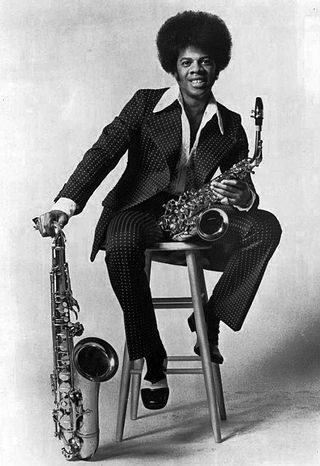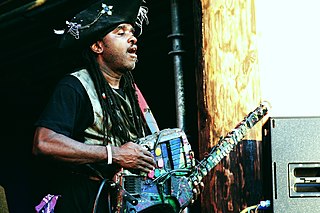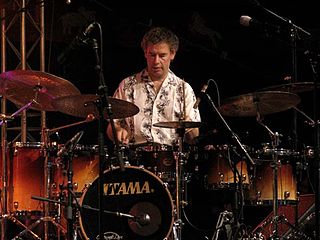
David Arkenstone is an American composer and performer. His music is primarily instrumental, with occasional vocalizations. Most of Arkenstone's music falls into new age category; however, he also worked in other genres, including even a heavy metal soundtrack for Emperor: Battle for Dune video game. His music has been described as 'soundtracks for the imagination'. Throughout his career, Arkenstone released over 50 albums and composed music for video games, including World of Warcraft, and for television, including NBC's Kentucky Derby. Arkenstone has been nominated for Grammy Awards five times.
Instrumental rock is rock music that emphasizes musical instruments and features very little or no singing. Examples of instrumental rock can be found in practically every subgenre of rock, often from musicians who specialize in the style. Instrumental rock was most popular from the mid-1950s to mid-1960s, with artists such as Bill Doggett Combo, The Fireballs, The Shadows, The Ventures, Johnny and the Hurricanes and The Spotnicks. Surf music had many instrumental songs. Many instrumental hits had roots from the R&B genre. The Allman Brothers Band feature several instrumentals. Jeff Beck also recorded two instrumental albums in the 1970s. Progressive rock and art rock performers of the 1960s and 1970s did many virtuosic instrumental performances.

Jazz fusion is a music genre that developed in the late 1960s when musicians combined jazz harmony and improvisation with rock music, funk, and rhythm and blues. Electric guitars, amplifiers, and keyboards that were popular in rock and roll started to be used by jazz musicians, particularly those who had grown up listening to rock and roll.

Tony MacAlpine is an American musician and composer. In a career spanning four decades, he has released twelve studio albums. MacAlpine is best known as an instrumental rock and heavy metal solo guitarist, although he has worked with many different bands and musicians in guest appearances and collaborations.

Accompaniment is the musical part which provides the rhythmic and/or harmonic support for the melody or main themes of a song or instrumental piece. There are many different styles and types of accompaniment in different genres and styles of music. In homophonic music, the main accompaniment approach used in popular music, a clear vocal melody is supported by subordinate chords. In popular music and traditional music, the accompaniment parts typically provide the "beat" for the music and outline the chord progression of the song or instrumental piece.
Matching Mole were an English progressive rock band associated with the Canterbury scene. Robert Wyatt formed the band in October 1971 after he left Soft Machine and recorded his first solo album, The End of an Ear. He continued his role on vocals and drums and was joined by David Sinclair of Caravan on organ and piano, Dave MacRae on electric piano, Phil Miller of Delivery on guitar and Bill MacCormick of Quiet Sun on bass. The name is a pun on Machine Molle, the French translation of the name of Wyatt's previous group Soft Machine.

A guitar solo is a melodic passage, instrumental section, or entire piece of music, pre-written to be played on a classical, electric, or acoustic guitar. In 20th and 21st century traditional music and popular music such as blues, swing, jazz, jazz fusion, rock and metal, guitar solos often contain virtuoso techniques and varying degrees of improvisation. Guitar solos on classical guitar, which are typically written in musical notation, are also used in classical music forms such as chamber music and concertos.

A rhythm section is a group of musicians within a music ensemble or band that provides the underlying rhythm, harmony and pulse of the accompaniment, providing a rhythmic and harmonic reference and "beat" for the rest of the band. The rhythm section is often contrasted with the roles of other musicians in the band, such as the lead guitarist or lead vocals whose primary job is to carry the melody.

A multi-instrumentalist is a musician who plays two or more musical instruments at a professional level of proficiency.
Planet X was an instrumental rock supergroup, founded by keyboardist Derek Sherinian and drummer Virgil Donati. They were active for a decade, releasing three studio albums and a live album, each with a variety of guest musicians and oft-changing lineups.

Roy Wilfred Wooten, also known as RoyEl, best known by his stage name Future Man, is an American musician, inventor and composer.

Gregg Bissonette is an American jazz and rock drummer and vocalist. He is the brother of bassist Matt Bissonette, with whom he frequently collaborates. He has played on albums by dozens of recording artists, including David Lee Roth's first three solo albums.

Chastain is an American heavy metal music band, formed in 1984 by guitarist David T. Chastain and signed by Shrapnel Records.

Sebastian Hardie were Australia's first symphonic rock band. They formed in Sydney in 1967 as Sebastian Hardie Blues Band but dropped the 'Blues Band' reference when they became pop-oriented. By 1973 they developed a more progressive rock style, and later performed as Windchase, but disbanded in 1977. An early member of Sebastian Hardie was Jon English, who starred as Judas Iscariot in the Australian version of the stage musical Jesus Christ Superstar in 1972, he subsequently had a solo career as a singer, actor and playwright. A later member, Mario Millo became a multi-award winner for his television and movie music.
Dr. Music was a Toronto jazz group founded in 1969 by producer, arranger and performer Doug Riley. The band recorded three albums and toured across Canada. The personnel of the band changed throughout its history, with Riley remaining at the core of the group.
Lelo Nazario is a Composer, arranger, pianist, producer and musical director whose work is marked by experimentation and timelessness. Recognized in his native Brazil and abroad as the creator of a unique style that blends contemporary classical music and jazz with avant-garde forms and Brazilian motifs, he wrote award-winning music which includes works for piano, orchestra and ensembles of various configurations as well as electroacoustic music, film scores, television, opera, dance and theater.
Gary Wehrkamp is an American musician, songwriter and producer. He is most notably a member of the American progressive rock band Shadow Gallery.
Survival is a Dutch Progressive / Symphonic rock band/project, initiated in 1981 by keyboard player and composer Jack Langevelt and inspired by classic bands like Trace, Emerson, Lake & Palmer, Ekseption, The Nice, Camel, Procol Harum and Deep Purple. The sound of Survival is characterized by strong dynamic melodies with odd time signatures and epic themes. Survival existed as a band between 1981 and 1997, although Jack continued making music under the name Survival.
Paul David Harbour is an American bass guitar and guitar player, pianist and composer. He is recognised for his work with David T. Chastain, Michael Harris and Tony MacAlpine. He has played in the bands "Leather", "Chastain" and "King Diamond". He teaches bass guitar, guitar and piano.

Bruford were a band assembled and led by British drummer Bill Bruford, originating in the late 1970s.